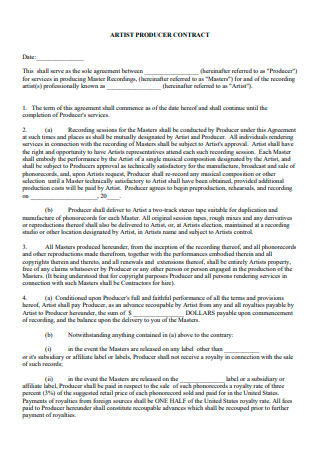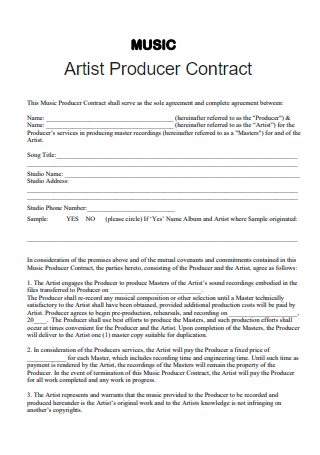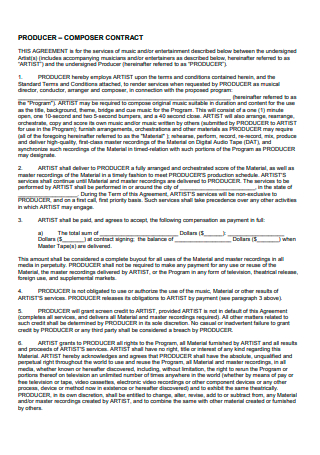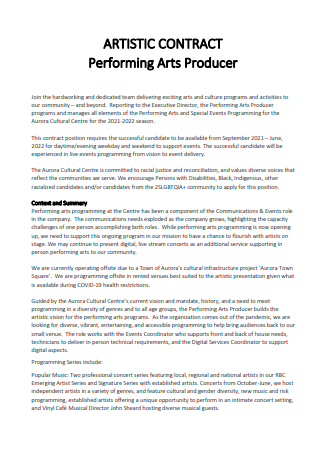3+ Sample Artist Producer Contract
FREE Artist Producer Contract s to Download
3+ Sample Artist Producer Contract
What Is An Artist Producer Contract?
What Is An Artist Producer?
What Does a Music Producer Do?
What Are the Skills of An Artist Producer?
What to Include in An Artist Producer Contract?
FAQs
How Much Does an Artist Pay a Producer?
Is Artist Production a Good Career?
Do You Need a Certificate to be a Music Producer?
How Many Hours do Music Producers Work?
What Does a Typical Day Look Like for a Music Producer?
With so many people giving this kind of career a try, it is so important to be aware about the Artist Producer Contract in order to know the rules and responsibilities of both parties.
What Is An Artist Producer Contract?
Artist Producer Contract is a written document that means the artist or producer must have agreements in place with any individual who contributed to the creation of the musical work so that it is understood who owns the copyright in the masters and/or the compositions and so that they can make the promises. Some of these agreements may require the artist to make certain representations and warranties regarding their rights in their music and their ownership of the relevant intellectual property. It is crucial to note that as an artist or producer progresses in their career as a creative professional, they may enter into other contracts with record labels, publishers, and other artists.
In addition, if an artist is working with a producer to explore new sounds or to learn about each other’s creative styles, a contract may not be immediately necessary. However, once they have decided to collaborate on a project, each party should show their intentions clearly in order to avoid excessive confusion in the future. For instance, the parties should discuss whether they intend to be joint authors in the musical work or whether the recording will be considered a work made for hire. In conclusion, an agreement should be in place when there is money on the table or significant risk involved, however, both artists and producers should speak to a music lawyer in order to assess the risk involved in pursuing a relationship without a written agreement in place and calculate the cost of negotiating and drafting such an agreement.
What Is An Artist Producer?
An artist producer, or record producer, assists an artist with their recording project, bringing their vision to fruition and guiding their sound along the way. They often direct the line of contact between the artist and art space, conveying technical requirements, space considerations, and troubleshooting scenarios leading up to the day of the performance or exhibit.
Additionally, artist producers normally elicit and capture artists’ performances in the recording studio to produce commercially, artistically, and technically acceptable master recordings. Some artists and producers avoid explicitly discussing the details of their relationship as it can negatively influence the workflow and creative atmosphere when there is too much business and money talk. On certain times, the artist-producer relationship is laid back and casual due to the nature of the music industry and the people therein. Nevertheless, the artist-producer relationship is one of the most important relationships that exist in the music industry and there are key contract terms to talk about when both parties are ready to get down to business.
What Does a Music Producer Do?
The role of a music producer has always been somewhat an indefinite one. Basically, it can mean a number of vastly different things. A producer holds many roles, but here are the most essential ones:
What Are the Skills of An Artist Producer?
Mastering all six skills is not required, but lacking any of this will have a negative impact on your career in the long run. Here are the skills an artist producer needs to practice:
What to Include in An Artist Producer Contract?
Here are some steps for both artists and producers on what to include in an artist producer contract:
Step 1: Determine Producer’s Compensation
Decide how much you will pay the producer. Paying per song is more cost-effective since just one song can burn through your budget at an hourly rate. You can pay them an hourly rate or a fixed sum for each song. Moreover, it is helpful to decide on how many points to give the producer. Points are a music industry term for the percentage of net record sales the producer receives as royalties. The industry standard is 2.5 points or 2.5%. Lastly, determine any other revenue the producer might get.
Step 2: Resolve Copyright Questions
The producer agreement must state who owns the master recordings. In most cases, the artist should also be the owner to make full commercial use of their songs.
Step 3: Decide on Composition Split
Agree on your specific roles when you write your contract. If the producer is a co-writer, include a clause transferring all administrative rights to yourself so that you will not have to get their permission every time you use your songs commercially.
Step 4: Agree On Producer Credit
Producers depend on getting proper credit for their professional reputation. Determine how you will credit the producer on your release and what language you will use.
FAQs
How Much Does an Artist Pay a Producer?
The record royalty for a producer is usually between 3% to 4% of the record’s sales price or 20% to 25% of the artist’s royalties. On a CD that sells for $10.98, the producer’s royalty would be about 33 cents for each copy sold and for a digital download of an album priced at $9.98 the producer receives 30 cents.
Is Artist Production a Good Career?
The merits of music production as a career come down to personal choice and an objective evaluation of skill sets and ambition. The demand for music is high in the industry, with cable and specialty TV stations demanding programming being an example of a growing segment.
Do You Need a Certificate to be a Music Producer?
Explore how the human ear perceives and interprets sounds and learn how to apply this knowledge to design a professional-level music production environment. Proof of a bachelor’s degree is required to enroll in non-degree, graduate-level certificates.
How Many Hours do Music Producers Work?
An artist producer is mostly at liberty to choose how long they work but the average is between 4 to 12 hours per day.
What Does a Typical Day Look Like for a Music Producer?
Generally, a full day’s work at the studio involves only about 2-3 hours of actual music production. A lot of my time will be spent on tweaking, searching, checking references, checking emails, and taking many breaks that might appear as procrastination.
Artist Producers have to make new ideas every day. The music industry still does good with its profits and the artists’, but technology has started a new trend in music, although it has had a positive effect on music for some time it still has its mistakes and is not perfect. With the addition of technology in music musicians don’t work as much as they would if they had to do everything manually. By creating drum machines and music production software the usage of live bands is no longer needed in studios unless that is the preference of the musician. The music producer in the studio with the artist is actually the person who uses all these technologies to make creating the music easier for the artist. So, in a way technology has had many beneficial effects on hip hop music. Artists also use technology to save them time and money. Other than touring, artists are constantly busy because being innovative in a position where other artists are also being innovative makes the process harder.
There is a large demand for music and computers are readily available to supply the demand but in doing that it is also throwing away its value. Another reason computers are the main stem is because with the internet, people are sharing music files and are downloading high quantities of music for free. By getting these downloads for free people will be highly reluctant to go to music stores and pay for their favorite artist’s brand-new albums. This is causing tensions in the music industry between the musicians and the producers because the musician has the pay the producer for their work if not done by themselves so the lower the money the musicians receive the amount the producer receives is even lower. Another reason technology has negatively affected the music industry is because listeners are not listening properly because people have gave up quality for convenience. This will continue because with the everlasting number of humans that are busy day to day, they want ways to incorporate their music with their busy lifestyles they don’t have time to sit down and listen to the music with detail which would be appreciating it. People love music and there will always be a want for it and exactly how people like it, but people won’t pay their money for a lack of quality or if they have the option to get if for no price at all.




